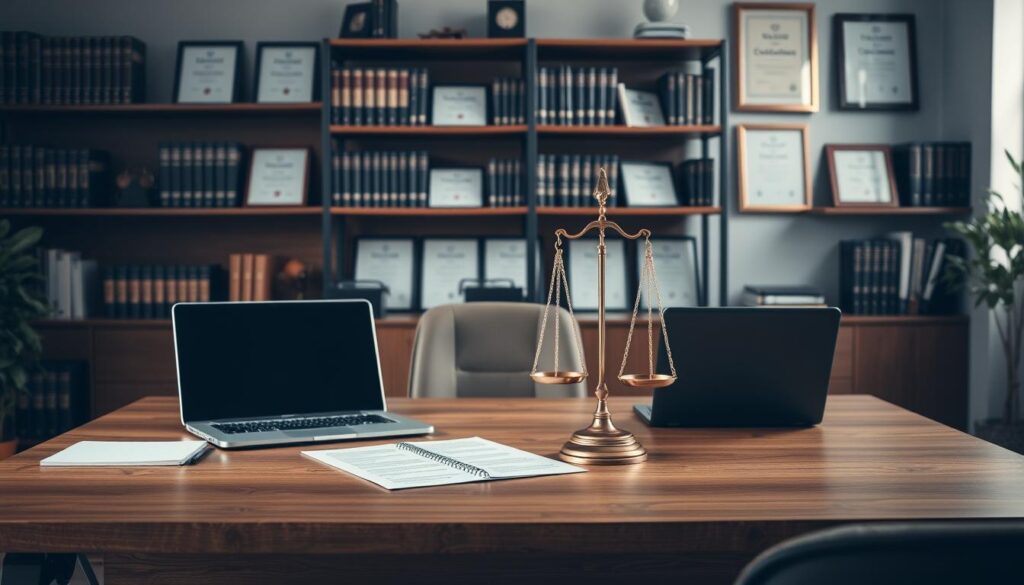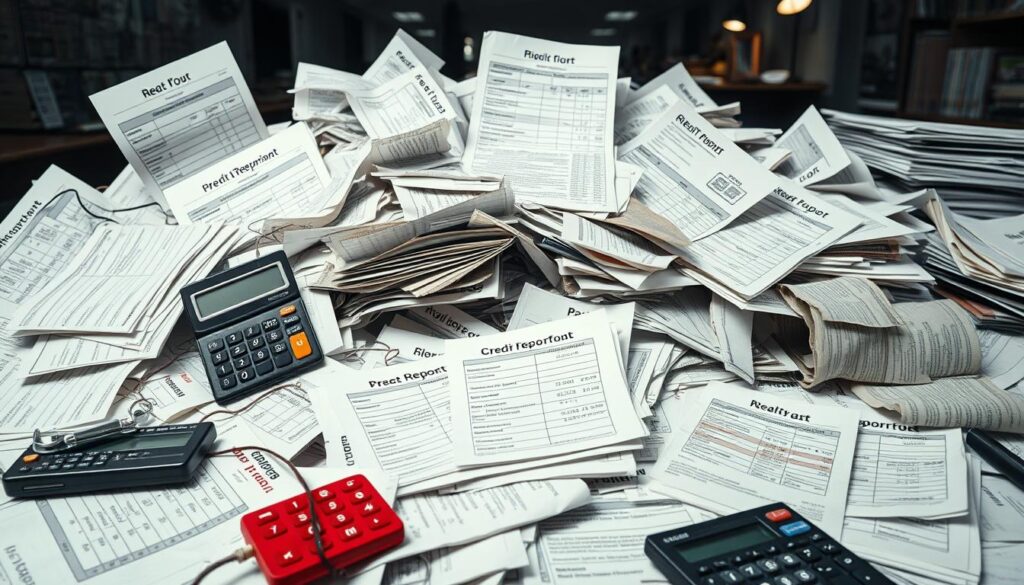A good credit profile is vital for many aspects of life. It affects loans, renting, and even job prospects. Credit report errors can seriously damage your financial health. These mistakes can lead to loan rejections and higher interest rates.
If you find errors in your credit report, act fast. Seek help from a credit dispute lawyer. These experts can protect your rights and fix your credit issues.
Credit dispute lawyers are experts in credit reporting laws. They help people fix errors that hurt their credit scores. These errors can range from wrong personal info to fake accounts.
Lawyers guide you through the credit dispute process. They make sure your rights are protected every step of the way.
Key Takeaways
- Maintaining a clean credit history is crucial for financial well-being.
- Credit report errors can lead to denied applications, higher interest rates, and identity theft.
- A credit dispute lawyer specializes in resolving credit report inaccuracies.
- Seeking legal assistance can ensure your rights are protected and credit disputes are handled effectively.
- Proactive measures can help prevent future credit report errors.
Understanding Credit Report Errors
Accurate credit history is vital for securing good loans and financial opportunities. Credit report errors are common and can harm your creditworthiness. These mistakes can damage your credit score and financial health.
Inaccuracies range from wrong personal info to incorrect account details. They can also include wrongful negative items. It’s crucial to spot and fix these errors.
Common Inaccuracies and Their Impact
Credit report errors often include mistaken personal details like wrong names or addresses. They may also show incorrect account information. For example, closed accounts might appear open.
Some reports list accounts that don’t belong to you. These credit report errors can lower your credit score. This makes it harder to get loans, credit cards, or housing.
The Importance of Maintaining a Clean Credit History
A clean credit history is key for good credit terms and loans. It can even affect your job prospects. Wrong credit information can hurt your credit score.
Inaccurate reports can lead to higher interest rates. They may cause issues with landlords or employers. You might struggle to rent an apartment or get a job.
- Difficulty in obtaining credit, loans, or mortgages
- Higher interest rates and less favorable credit terms
- Potential issues with landlords or employers who conduct credit checks
- Challenges in renting an apartment or securing a job
Monitor your credit report regularly. Dispute any credit report errors you find. This helps maintain an accurate credit history. It ensures access to the financial opportunities you deserve.
“Maintaining a clean and accurate credit history is essential for financial well-being and security.”
| Common Credit Report Errors | Potential Impact |
|---|---|
| Incorrect personal information (name, address, etc.) | Lower credit score, difficulty obtaining credit |
| Erroneous account details (closed accounts reported as open, accounts that don’t belong to the individual) | Decreased creditworthiness, higher interest rates |
| Wrongful negative items (late payments, collections, etc.) | Significant damage to credit score, limited financial opportunities |
The Fair Credit Reporting Act
The Fair Credit Reporting Act (FCRA) safeguards consumer rights regarding credit information. This federal law, enacted in 1970, oversees credit data handling by bureaus, lenders, and other entities.
The FCRA establishes crucial consumer protections, including the right to dispute inaccurate credit report information. Credit bureaus must investigate and resolve disputes promptly, ensuring reliable and accurate credit histories.
A key FCRA benefit is free annual credit reports from bureaus. This allows people to check their credit info regularly. Consumers can spot errors and keep their credit profiles clean.
| Key Provisions of the Fair Credit Reporting Act |
|---|
|
Knowing your FCRA rights helps you maintain accurate credit information. You can take action to address any errors or inaccuracies in your credit report.
When to Seek Legal Assistance
Credit disputes can be overwhelming. Knowing when to get help from credit dispute lawyers is crucial. Legal aid can resolve credit report errors and protect your finances.
Signs You Need a Credit Dispute Lawyer
- Persistent disputes with credit bureaus: If credit bureaus ignore your requests to fix errors, consult a credit dispute lawyer. They can help when bureaus refuse to make corrections.
- Inability to resolve errors independently: Complex credit report errors may require legal expertise. A credit repair attorney can guide you when your efforts fail.
- Threat of financial consequences: Wrong credit info can lead to loan denials or higher interest rates. It might even affect job prospects. A credit dispute lawyer can protect your rights and reduce these risks.
Recognizing these signs is important. A qualified credit dispute lawyer can help you navigate the process effectively. They can also safeguard your financial future.

“Working with a credit dispute lawyer helped me resolve a longstanding error on my credit report that was negatively impacting my ability to secure a mortgage. Their expertise and persistence were invaluable in getting the issue resolved.”
– Emily, satisfied client
The Role of a Credit Dispute Lawyer
Credit dispute lawyers are vital in fixing credit report errors. They know the Fair Credit Reporting Act inside out. These experts can talk to credit bureaus for you.
Navigating the Credit Dispute Process
Credit dispute lawyers know the ins and outs of credit disputes. They protect your rights every step of the way. These pros help spot errors and gather proof.
A credit dispute lawyer won’t give up until issues are solved. They follow up with credit bureaus tirelessly. If needed, they advise on legal steps for slow responses.
“A credit dispute lawyer can be your greatest asset in navigating the often-complex credit dispute process and ensuring your credit report remains accurate and reflective of your true financial standing.”
A credit repair attorney boosts your chances of fixing credit report errors. This can improve your financial health and creditworthiness. Their skills make a big difference.
| Key Benefits of Working with a Credit Dispute Lawyer | Advantages |
|---|---|
| Expertise in FCRA and credit dispute laws | Ensures your rights are protected and dispute process is handled properly |
| Effective communication with credit bureaus | Increases the likelihood of a successful credit dispute resolution |
| Persistence and follow-up with credit bureaus | Helps ensure timely and thorough resolution of credit report errors |
| Guidance on appropriate legal actions | Provides options for recourse if credit bureaus fail to address issues |
dispute credit errors lawyer
A skilled dispute credit errors lawyer can be crucial in fixing credit report mistakes. These experts navigate complex credit disputes effectively. They help people recover from damaging inaccuracies on their credit reports.
A credit dispute lawyer can tackle various credit report issues, including:
- Incorrect personal information
- Erroneous account details
- Fraudulent or unauthorized accounts
- Outdated or incomplete information
- Errors in the reporting of public records, collections, or judgments
These lawyers use their Fair Credit Reporting Act knowledge to your advantage. They negotiate with credit bureaus, creditors, and debt collectors. Their efforts increase the chances of resolving your credit issues successfully.
A dispute credit errors lawyer offers valuable legal guidance and representation. They can help if your dispute leads to formal litigation. These experts explain your rights and explore your options.
Working with a credit dispute lawyer can transform your credit repair journey. They provide confidence in navigating complex credit disputes. Their expertise ensures your credit report accurately reflects your creditworthiness.
Choosing the Right Credit Dispute Attorney
Hiring the right credit dispute lawyer is vital for addressing credit report errors. These experts navigate complex consumer protection laws to safeguard your rights. Let’s explore key qualities to seek in a credit dispute attorney.
Qualifications and Experience to Look For
- Expertise in Consumer Protection Laws: A credit dispute lawyer should deeply understand the Fair Credit Reporting Act and other relevant legislation. This knowledge enables effective challenges to credit report inaccuracies.
- Track Record of Successful Dispute Resolutions: Seek an attorney with proven success in resolving credit disputes. This shows their ability to achieve positive outcomes.
- Personalized Legal Strategies: Good lawyers tailor strategies to your unique situation. They should provide a clear plan to address specific credit report issues.
- Commitment to Client Communication: Choose a responsive attorney who keeps you informed. Transparency and open communication are crucial throughout the process.
Selecting a credit dispute lawyer with the right skills can boost your chances of success. They’ll help resolve credit report errors effectively.
A qualified attorney will work to maintain a clean credit repair attorneys history for you. Their expertise is invaluable in navigating complex credit issues.

Credit Repair Attorneys vs. Credit Repair Companies
Fixing credit report errors can be done through credit repair attorneys or companies. Both help improve credit standing. Each approach has its own benefits and drawbacks.
Credit repair attorneys offer specialized legal expertise for credit disputes. They know the Fair Credit Reporting Act (FCRA) inside out. These lawyers can effectively challenge wrong or fraudulent information on credit reports.
Credit repair attorneys provide strong consumer protection. They make sure your rights are safe during the dispute process. Their legal knowledge helps tackle complex credit issues effectively.
| Credit Repair Attorneys | Credit Repair Companies |
|---|---|
| Legal expertise in credit disputes | Typically provide a more limited scope of services |
| Stronger consumer protections under FCRA | May have less comprehensive understanding of credit laws |
| Can effectively challenge a wider range of credit report errors | May focus on simpler, more straightforward credit issues |
| May provide a more personalized and tailored approach | Often offer a more cost-effective solution for basic credit repair |
Credit repair companies offer a simpler, cheaper way to fix basic credit issues. They can handle common errors like late payments or wrong account info. However, they may lack the legal expertise of attorneys.
Before hiring a credit repair company, do your research. Make sure they work ethically and follow the law. Your choice depends on your credit issues, budget, and need for legal protection.
The Credit Dispute Process Explained
The credit dispute process can be tricky. But knowing the steps helps you fix errors on your credit report. This guide will show you how to take charge of your finances.
Identifying and Documenting Credit Report Errors
Start by checking your credit report for mistakes. Look for wrong account info, fraud, or identity mix-ups. Collect proof like bills, receipts, or letters from creditors to back up your case.
Submitting Disputes to Credit Bureaus
Next, file a formal credit dispute with the credit bureaus. You can do this online, by mail, or with a lawyer’s help. Follow each bureau’s instructions carefully and include all your evidence.
Monitoring the Investigation Process
Credit bureaus have 30 to 45 days to investigate your credit dispute. Keep an eye on the progress during this time. Be ready to provide more info if they ask for it.
Ensuring a Successful Resolution
If the bureaus find errors, they must fix or remove them. Check your credit report after to make sure the changes were made. This helps keep your credit history accurate.
The credit dispute process can be tough. But with patience and care, you can fix credit report errors. This will help improve your overall financial health.
Dealing with Unresponsive Credit Bureaus
Credit dispute processes can be tough when bureaus don’t respond. Consumers have rights to quick, thorough investigations. But what can you do when bureaus won’t cooperate?
Legal Options for Resolving Disputes
Consumers have legal options when credit bureaus ignore them. These can help fix credit report errors.
- Filing complaints with regulatory agencies, such as the Consumer Financial Protection Bureau (CFPB) or the Federal Trade Commission (FTC), which can investigate the credit bureau’s conduct and take appropriate action.
- Initiating a lawsuit against the credit bureau under the provisions of the Fair Credit Reporting Act (FCRA), which can result in the recovery of damages and the correction of inaccurate information on the consumer’s credit report.
- Requesting a direct communication with the credit bureau’s legal department, which may prompt a more timely and thorough investigation of the dispute.
Knowing your rights is key when dealing with unresponsive credit bureaus. Taking action can help fix errors and keep your credit history accurate.
| Legal Option | Description | Potential Outcomes |
|---|---|---|
| Regulatory Complaint | Filing a complaint with a government agency, such as the CFPB or FTC | Agency investigation, potential enforcement action, and resolution of the dispute |
| FCRA Lawsuit | Initiating a lawsuit against the credit bureau under the Fair Credit Reporting Act | Monetary damages, correction of inaccurate information, and improved credit report accuracy |
| Direct Communication | Requesting a direct communication with the credit bureau’s legal department | Prompt investigation and resolution of the dispute, avoiding further legal action |
Understanding credit bureaus disputes and credit dispute process options is crucial. It helps you tackle unresponsive credit bureaus effectively. This ensures your credit reports stay accurate and current.

Inaccurate Credit Information and Its Consequences
Inaccurate credit information can deeply affect your financial life. It can lead to loan denials and limit job opportunities. Inaccurate credit information and credit score errors can harm your financial health.
Wrong credit data can distort your credit score. A lower score, even if incorrect, can make getting loans difficult. Lenders and landlords often use credit scores to make decisions.
Any errors can lead to unfair treatment. This can affect your ability to rent an apartment. It can also impact your chances of getting credit cards.
| Consequence | Impact |
|---|---|
| Loan Denials | Inaccurate credit information can result in loan applications being rejected, limiting your ability to finance major purchases, such as a home or a car. |
| Higher Interest Rates | If you’re able to secure a loan, the interest rate may be higher due to the perceived risk associated with your credit profile, even if the information is inaccurate. |
| Employment Challenges | Some employers may use credit checks as part of the hiring process, and inaccurate credit information could jeopardize your employment opportunities. |
Fixing inaccurate credit information and credit score errors is vital for financial stability. Know your rights and dispute any errors. This helps protect your credit history and show your true creditworthiness.
“Inaccurate credit information can have far-reaching consequences that go beyond just your credit score. It’s essential to address any discrepancies to safeguard your financial well-being.”
Your credit report is key to your financial identity. It’s up to you to keep it accurate. Stay alert and fix any errors quickly.
This way, you can reduce the impact of inaccurate credit information. You’ll also minimize credit score errors. These steps pave the way for a brighter financial future.
Debt Validation: Challenging Erroneous Debts
Consumers can dispute debts on their credit history. The Fair Debt Collection Practices Act (FDCPA) helps with this process. It lets people challenge the accuracy of debts.
Knowing your rights is key to fixing credit history inaccuracies. It’s also crucial for dealing with debt validation issues.
Your Rights and Obligations
You can ask for debt validation within 30 days of contact. The collector must provide written proof of the debt. This includes the original creditor’s name and amount owed.
If they don’t provide info, they must stop collection efforts. You need to respond quickly to validation requests. Ignoring them can make the debt seem valid.
A credit dispute lawyer can help with debt validation. They know the FDCPA well. These experts can help you challenge wrong debts.
| Your Rights | Your Obligations |
|---|---|
|
|
Knowing your rights helps you challenge erroneous debts. It protects your credit history from mistakes. A skilled lawyer can boost your chances of validating debts.
Credit History Inaccuracies and Loan Approvals
An accurate credit history is vital for securing favorable loan approvals. Credit history errors can lead to credit denials or unfavorable loan terms. This can limit access to important financial opportunities.
Credit report mistakes can include wrong account details or undeserved negative items. These errors can greatly affect a person’s creditworthiness. Lenders use credit reports to assess risk and set loan terms.
Inaccuracies may make lenders see borrowers as high-risk. This can result in loan denials or worse terms. Such outcomes can impact getting mortgages, auto loans, or personal financing.
To reduce the effects of credit errors, people should check their reports often. They should address any issues through the credit dispute process. Accurate credit histories increase chances of getting better loan terms.
| Loan Type | Impact of Credit History Inaccuracies |
|---|---|
| Mortgage | Potential denial or higher interest rates |
| Auto Loan | Reduced financing options and higher costs |
| Personal Loan | Difficulty obtaining approval or less favorable terms |
Knowing how credit errors affect loan approvals is crucial. It helps people take steps to maintain clean credit profiles. This can improve financial opportunities and help achieve personal goals.

Rebuilding Your Credit After Successful Disputes
Resolving credit report inaccuracies is just the beginning. Now, focus on rebuilding your credit history. This involves adopting responsible financial habits and managing your credit effectively.
Maintaining a low credit utilization ratio is crucial. Keep your credit card balances below 30% of your total limit. This strategy helps improve your credit profile.
Make timely payments on all credit accounts. This includes credit cards, loans, and other financial obligations.
- Make timely payments on all your credit accounts, including credit cards, loans, and other financial obligations.
- Consider becoming an authorized user on someone else’s credit card with a long, positive history to piggyback on their good credit.
- Monitor your credit reports regularly to ensure that the credit repair efforts are reflected accurately and that no new errors arise.
These steps will help rebuild your credit score over time. Regular monitoring ensures your efforts are reflected accurately. Patience and diligence are essential in credit repair.
“Rebuilding credit takes time, but it’s a worthwhile investment in your financial future.”
Avoiding Future Credit Report Errors
Your financial health depends on an accurate credit history. Take action to prevent credit report errors and inaccuracies. Stay alert and be proactive to maintain a clean credit record.
Proactive Measures to Maintain Accurate Credit
Here are some steps to keep your credit report error-free:
- Review your credit report regularly, at least once a year, to identify any discrepancies or errors.
- Promptly dispute any credit report errors you find with the credit bureaus. Follow up on the disputes to ensure they are resolved effectively.
- Keep track of your credit utilization ratio, which is the amount of credit you’re using compared to your total available credit. Aim to keep this ratio low to maintain a healthy credit profile.
- Monitor your credit accounts for any unauthorized activity or suspicious transactions, and report any concerns to your lenders and the credit bureaus immediately.
- Update your personal and financial information, such as your address, employment status, and income, with your lenders and the credit bureaus to ensure the accuracy of your credit history.
Taking charge of your credit empowers you. It helps prevent errors from harming your financial future. Stay on top of your credit to secure your financial well-being.
Conclusion
Addressing credit report errors is vital for a healthy financial standing. These inaccuracies can hinder loan approvals and harm your creditworthiness. Swift action is necessary to protect your financial future.
If you’ve found dispute credit errors lawyer, credit report errors, or inaccurate credit information, act now. A skilled credit dispute lawyer can help navigate the complex process.
Partnering with a dispute credit errors lawyer helps you regain control of your finances. You can secure better loan terms and enjoy peace of mind. Don’t let errors jeopardize your financial well-being.
Take the first step towards resolving these issues today. A brighter financial future awaits with an accurate credit report.

